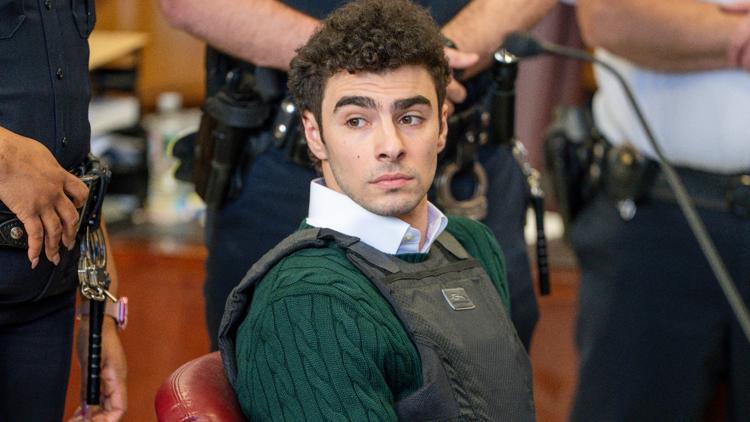Share this @internewscast.com

Luigi Mangione, 26, faces separate federal and state murder charges for the killing.
NEW YORK — U.S. Attorney General Pam Bondi said Tuesday she has directed federal prosecutors to seek the death penalty against Luigi Mangione, the man accused of gunning down UnitedHealthcare CEO Brian Thompson outside a Manhattan hotel on Dec. 4.
It is the first time the Justice Department has sought to bring the death penalty since President Donald Trump returned to office in January with a vow to resume federal executions.
Mangione, a 26-year-old Ivy League graduate, faces separate federal and state murder charges for the killing, which rattled the business community while galvanizing health insurance critics.
The federal charges include murder through use of a firearm, which carries the possibility of the death penalty. The state charges carry a maximum punishment of life in prison. Mangione has pleaded not guilty to a state indictment and has not entered a plea to the federal charges.
Prosecutors have said the two cases will proceed on parallel tracks, with the state case expected to go to trial first. It wasn’t immediately clear if Bondi’s announcement will change the order.
“Luigi Mangione’s murder of Brian Thompson — an innocent man and father of two young children — was a premeditated, cold-blooded assassination that shocked America,” Bondi said in a statement that described Thompson’s killing as “an act of political violence.”
“After careful consideration, I have directed federal prosecutors to seek the death penalty in this case as we carry out President Trump’s agenda to stop violent crime and Make America Safe Again,” Bondi said.
A message seeking comment was left for a spokesperson for Mangione’s lawyers.
Thompson, 50, was ambushed and shot on a sidewalk outside the New York Hilton Midtown as he arrived for his company’s annual investor conference.
Surveillance video showed a masked gunman shooting Thompson from behind. Police say the words “delay,” “deny” and “depose” were scrawled on the ammunition investigators found at the scene, mimicking a phrase commonly used to describe insurer tactics to avoid paying claims.
Mangione was arrested in Altoona, Pennsylvania, about 230 miles (about 370 kilometers) west of New York City, after a five-day manhunt.
Police said Mangione had with him a 9mm handgun that matched the one used in the shooting and other items including a fake ID and a notebook described by authorities as a “manifesto” in which they say he expressed hostility toward the health insurance industry and wealthy executives.
Among the entries in the notebook, prosecutors said, was one from August 2024 that said “the target is insurance” because “it checks every box” and one from October that describes an intent to “wack” an insurance company CEO.
UnitedHealthcare is the largest health insurer in the U.S., though the company said Mangione was never a client.
Mangione’s lawyer, Karen Friedman-Agnifilo, has said she would seek to suppress some of the evidence seized during his arrest. She has also taken issue with the parallel prosecutions, accusing “warring jurisdictions” of turning Mangione into a “human ping-pong ball.”
After his arrest, Mangione was whisked by plane and helicopter back to New York and walked slowly up a Manhattan pier in a highly choreographed spectacle by a throng of officers with assault rifles and a contingent that included New York City Mayor Eric Adams.
Trump, who oversaw an unprecedented run of executions at the end of his first term, signed an executive order on his first day back in office on Jan. 20 that compels the Justice Department to seek the death penalty in federal cases where applicable.
Mangione’s case is the first time Bondi has ordered prosecutors to pursue the death penalty since she took office in February and immediately lifted a moratorium that that had been imposed under former President Joe Biden’s administration. The Trump administration has signaled it will aggressively push for death sentences for certain crimes, accusing the Biden administration of going easy on violent criminals.
Trump’s administration carried out 13 federal executions during his first term, more than under any president in modern history.
Biden campaigned on a pledge to work toward abolishing federal capital punishment but took no major steps to that end. But in his final days in office, the Democratic president commuted the sentences of 37 of the 40 people on death row, converting their punishments to life in prison.
















